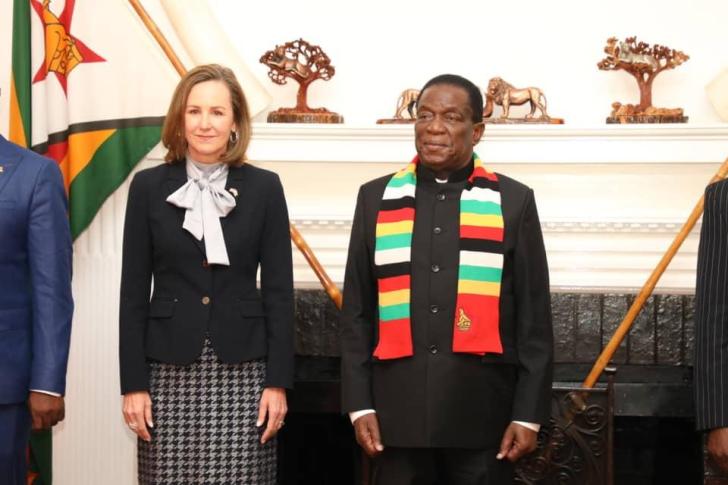News / National
US Ambassador to Zimbabwe unfazed by anti-sanctions protestors at embassy
16 Oct 2024 at 10:54hrs |
0 Views

The newly appointed US Ambassador to Zimbabwe, Pamela Tremont, has downplayed the significance of anti-sanctions protestors camped outside the US Embassy in Harare, describing the group as being "just for show." The protestors, who belong to the Broad Alliance Against Sanctions (BAAS), have been stationed at the embassy's main entrance since March 2019, vowing to remain until sanctions on Zimbabwe are fully lifted.
In March 2024, US President Joe Biden announced the termination of the Zimbabwe sanctions program, which had been in place since the early 2000s following violent land seizures from predominantly white commercial farmers without compensation. The sanctions, imposed via Executive Orders in 2003, 2005, and 2008, were aimed at blocking properties of individuals believed to be acting on behalf of those targeted under the International Emergency Economic Powers Act.
While the comprehensive sanctions program has ended, the US has maintained tighter restrictions on a few high-ranking Zimbabwean individuals and entities through the Global Magnitsky Act. This act allows the US to impose visa restrictions and targeted sanctions on foreign government officials accused of gross human rights violations and corruption. Among those still on the sanctions list are President Emmerson Mnangagwa, First Lady Auxillia Mnangagwa, Vice President Constantino Chiwenga, former State Security Minister Owen Ncube, businessman Kudakwashe Tagwirei, and Central Intelligence Organization (CIO) Deputy Director Walter Tapfumaneyi.
Despite the sanctions now targeting only a select group of individuals, the Zimbabwean government continues to argue that the measures negatively impact ordinary citizens and should be lifted. The BAAS protestors have echoed these sentiments throughout their five-year demonstration.
However, in a meeting with local news editors, Ambassador Tremont dismissed the protestors as irrelevant to the broader conversation. "They are for show," she said, adding that there had been no engagement with the group since her arrival.
"We hear a lot about the sanctions from the government already without having to engage protestors," Tremont noted, downplaying their role in the ongoing sanctions debate. She further rejected the Zimbabwean government's narrative that the sanctions are "illegal," arguing that there is no international law preventing the US from regulating its own financial institutions and ensuring they do not become complicit in corruption.
Meanwhile, Zimbabwe is preparing for the annual Southern African Development Community (SADC) Anti-Sanctions Day, set for October 25. This year's event will run under the theme "Embracing Innovation Towards Vision 2030: The Relentless Fight Against Illegal Sanctions," highlighting the government's ongoing efforts to push for the complete removal of sanctions, despite their current focus on individual targets.
In March 2024, US President Joe Biden announced the termination of the Zimbabwe sanctions program, which had been in place since the early 2000s following violent land seizures from predominantly white commercial farmers without compensation. The sanctions, imposed via Executive Orders in 2003, 2005, and 2008, were aimed at blocking properties of individuals believed to be acting on behalf of those targeted under the International Emergency Economic Powers Act.
While the comprehensive sanctions program has ended, the US has maintained tighter restrictions on a few high-ranking Zimbabwean individuals and entities through the Global Magnitsky Act. This act allows the US to impose visa restrictions and targeted sanctions on foreign government officials accused of gross human rights violations and corruption. Among those still on the sanctions list are President Emmerson Mnangagwa, First Lady Auxillia Mnangagwa, Vice President Constantino Chiwenga, former State Security Minister Owen Ncube, businessman Kudakwashe Tagwirei, and Central Intelligence Organization (CIO) Deputy Director Walter Tapfumaneyi.
However, in a meeting with local news editors, Ambassador Tremont dismissed the protestors as irrelevant to the broader conversation. "They are for show," she said, adding that there had been no engagement with the group since her arrival.
"We hear a lot about the sanctions from the government already without having to engage protestors," Tremont noted, downplaying their role in the ongoing sanctions debate. She further rejected the Zimbabwean government's narrative that the sanctions are "illegal," arguing that there is no international law preventing the US from regulating its own financial institutions and ensuring they do not become complicit in corruption.
Meanwhile, Zimbabwe is preparing for the annual Southern African Development Community (SADC) Anti-Sanctions Day, set for October 25. This year's event will run under the theme "Embracing Innovation Towards Vision 2030: The Relentless Fight Against Illegal Sanctions," highlighting the government's ongoing efforts to push for the complete removal of sanctions, despite their current focus on individual targets.
Source - newzimbabwe
Join the discussion
Loading comments…



























